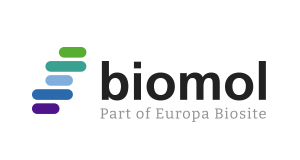Macrophage Inflammatory protein-3 alpha (CCL20), mouse recombinant (rmMIP3a)
Macrophage Inflammatory protein-3 alpha (CCL20), mouse recombinant (rmMIP3a)
Artikelnummer
BOL97325.1
Verpackungseinheit
1 mg
Hersteller
Biomol
Verfügbarkeit:
wird geladen...
Preis wird geladen...
Kategorie: Cytokines
Formulation: purified
Storage: -20°C
Weight: 7900 D
Description: Chemotactic factor that attracts lymphocytes and, slightly, neutrophils, but not monocytes (By similarity). May be involved in formation and function of the mucosal lymphoid tissues by attracting lymphocytes and dendritic cells towards epithelial attracting lymphocytes and dendritic cells towards epithelial cells (By similarity). (www.uniprot.org) Recombinant mouse Macrophage Inflammatory Protein-3 alpha produced in E.coli is a single, non-glycosylated, polypeptide chain containing 70 amino acids and having a molecular mass of 7.9 kDa. CCL20 is a chemotactic factor that draws lymphocytes and neutrophils, rather than monocytes. MIP-3 alpha inhibits proliferation of myeloid progenitors in colony formation assays. MIP3A plays a role in the formation and function of the mucosal lymphoid tissues by attracting lymphocytes and dendritic cells towards epithelial cells. C-terminal processed forms have been shown to be equally chemotactically active for leukocytes. CCL20 holdes antibacterial activity E.coli atcc 25922 and s.aureus atcc 29213. CCL20 gene transcription is activated by H. pylori, which activates NF-kappaB through intracellular signal pathway which involves IkappaB kinase and NF-kappaB-inducing kinase. MIP-3 alpha is invloved in chemokine-mediated lymphocyte trafficking during gastric inflammation in Helicobacter infection. CCL20 expression is involved in the recruitment of CD45R0-positive T cell subsets into the intestinal lamina propria. MIP-3A is in charge of the advancement of pulpal inflammation through the recruitment of C-C motif Receptor 6-expressing lymphocytes Vaginal epithelial cells respond to factors present in semen by secreting MIP-3 alpha, which increases langerhans cells recruitment during HIV transmission.
Formulation: purified
Storage: -20°C
Weight: 7900 D
Description: Chemotactic factor that attracts lymphocytes and, slightly, neutrophils, but not monocytes (By similarity). May be involved in formation and function of the mucosal lymphoid tissues by attracting lymphocytes and dendritic cells towards epithelial attracting lymphocytes and dendritic cells towards epithelial cells (By similarity). (www.uniprot.org) Recombinant mouse Macrophage Inflammatory Protein-3 alpha produced in E.coli is a single, non-glycosylated, polypeptide chain containing 70 amino acids and having a molecular mass of 7.9 kDa. CCL20 is a chemotactic factor that draws lymphocytes and neutrophils, rather than monocytes. MIP-3 alpha inhibits proliferation of myeloid progenitors in colony formation assays. MIP3A plays a role in the formation and function of the mucosal lymphoid tissues by attracting lymphocytes and dendritic cells towards epithelial cells. C-terminal processed forms have been shown to be equally chemotactically active for leukocytes. CCL20 holdes antibacterial activity E.coli atcc 25922 and s.aureus atcc 29213. CCL20 gene transcription is activated by H. pylori, which activates NF-kappaB through intracellular signal pathway which involves IkappaB kinase and NF-kappaB-inducing kinase. MIP-3 alpha is invloved in chemokine-mediated lymphocyte trafficking during gastric inflammation in Helicobacter infection. CCL20 expression is involved in the recruitment of CD45R0-positive T cell subsets into the intestinal lamina propria. MIP-3A is in charge of the advancement of pulpal inflammation through the recruitment of C-C motif Receptor 6-expressing lymphocytes Vaginal epithelial cells respond to factors present in semen by secreting MIP-3 alpha, which increases langerhans cells recruitment during HIV transmission.
| Artikelnummer | BOL97325.1 |
|---|---|
| Hersteller | Biomol |
| Hersteller Artikelnummer | 97325.1 |
| Verpackungseinheit | 1 mg |
| Mengeneinheit | STK |
| Reaktivität | Mouse (Murine) |
| Wirt | Escherichia Coli |
| Produktinformation (PDF) | Download |
| MSDS (PDF) |
|

 English
English






